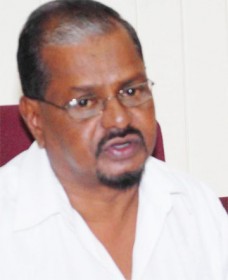Local Government Minister Kellawan Lall yesterday said he is yet to receive any correspondence from the major international donors on local government reforms.

“I will not comment any further on the matter but to say that I find it offensive that such important national issues being discussed at the level of our national parliament and a senior representative of the state are being treated in this manner,” Lall said in a statement, reacting to an article in yesterday’s Stabroek News.
This newspaper reported that the major international donors wrote Lall, urging an integrated approach to implementation of legislative reforms for local government, while recommending that the legislature explore ways to curb ministerial discretion over local authorities.
But Lall said that up to yesterday afternoon he had not received the correspondence. The letter had been copied to the leaders of the parliamentary parties.
In a joint letter to Lall, the chair of a special select committee reviewing the reforms for implementation, the representatives of the US, the UK, Canada and the EU Delegation outlined their collective views of what steps parliament and the government might consider, to ensure that the reform spirit reflected in the proposed legislation would be sustained and the various measures would be implemented. The letter was signed by Canadian High Commissioner, Charles Court; UK High Commissioner Fraser Wheeler, Charge d’Affaires of the US Embassy Karen Williams and Head of the European Delegation Geert Heikens
The select committee is reviewing the Local Authorities (Elections) (Amendment) Bill 2009, the Fiscal Transfers Bill 2009, the Local Government Commission Bill 2009, the Local Government (Amendment) Bill 2009 and the Municipal and District Councils (Amendment) Bill 2009, all considered crucial to revamping the local government system. Ironing out the proposed legislation had previously been the mandate of the Joint Task Force on Local Government Reform, which had been working for eight years before it was abandoned in favour of the parliamentary review, which government hopes would see the holding of polls this year.
In their letter, the donors commended the government for presenting the reforms as a package to the National Assembly, noting that the Task Force had understood the importance of an “integrated approach” to reform. In this vein, it was noted that the three principal bills–the Local Authorities (Elections) (Amendment) Bill 2009, the Local Government Commission Bill 2009 and the Fiscal Transfers Bill 2009–are “interdependent” and “mutually reinforcing.” As a result, the donors argued that it is “important” that they “proceed together” through the process of parliamentary debate, passage and implementation.
However, they also said the Fiscal Transfers Bill and the Local Government Commission Bill would be strengthened with “more precision” in setting timelines for the development and implementation of the formula for fiscal transfers, and for the operationalization of the Commission. Further, for the Commission to succeed, they argued, it must be seen to act impartially, competently and effectively and they recommended that Parliament look at the process for appointment to ensure it is inclusive and is seen to be able to act independently in accordance with its mandate under statute.
They were also critical of the fact that the legislation retains much of the discretionary powers available to the Minister, which they noted has been the subject of considerable debate and a continuing concern of local councils, particularly at the municipal level. As a result, they suggested that regulations for the legislation could set out transparent criteria for the exercise of ministerial discretion and that the legislation itself could describe the ministerial powers as exceptional rather than routine.
Additionally, they proposed that the National Assembly consider creating a Standing Committee for local government to facilitate continuing dialogue on its future, following the implementation of enacted reforms and provide oversight of the Local Government Commission, while also emphasising the need for voters to be fully informed about the new electoral process.





